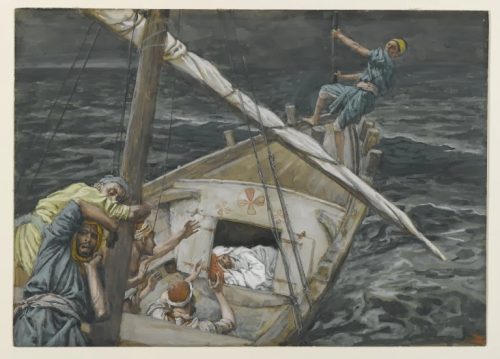“Teacher, do you not care that we are perishing?”
These days, I can often identify with the disciples and the terror they must have felt in the storm described from our reading in Mark today. Every time we hear of another mass shooting, every time we hear of another atrocity, every time we hear of another example of humans treating other human beings as less than human, the disciples’ words can easily become our cry…”Do you not care if we are perishing, God?”
It’s easy to put ourselves in the emotions of the disciples. All they wanted to do was get to the other side of the lake, and this storm comes up, and the water is filling up the boat. There’s nothing to do but bail–and the disciples look over and see Jesus snoozing on the cushion. It’s so easy for us to put ourselves in that place that is equal parts fear and misguided anger, isn’t it? They’re scared to death–and in all honesty, they’re angry that Jesus isn’t helping them bail.
It’s a hard Gospel story in some ways. Isn’t Jesus their friend? Wouldn’t a friend be more empathetic? Wouldn’t a friend be helping bail the boat?
Yet here is what always sticks out for me when I ponder this parable:
Jesus doesn’t bail the boat out; Jesus calms the storm.
The disciples are focused on the water.
Jesus is focused on the storm.
In this story, so many things come into play when we think deeply about it. The disciples weren’t just riding along by themselves, they had the Son of God in the boat with them…yet it didn’t mean all their trips were going to be free of adversity that was out of their control. They thought what Jesus should be doing was bailing, but Jesus did something else–he looked at the bigger picture when the disciples were focused on the details. Perhaps what is most telling of all, is that in the end, what’s really revealed in the story doesn’t have anything to do with storms or boats or water pouring into them. What’s revealed is that the disciples feared the uncontrollable powers of nature more than they trusted Jesus. It’s only when they peer through the retrospectoscope that they start to get a glimpse of the fact they were in the presence of the Divine. “Who then is this, that even the wind and the sea obey him?”
The story challenges us to think back to the storms we’ve weathered in our lives. Was God in the boat and we didn’t even acknowledge it? Were we so focused on the water pouring in that we forgot that the real problem was the storm? Did we take that fear and convert it to misplaced anger? Were we convinced what God needed to do was help us bail, when God’s eye was on the storm all the time and we simply didn’t notice? Did we fear more than we trusted?
Yet even when we do trust, it would be a mistake to say we need to stop bailing. Had the disciples not been bailing that boat out, they would have been engulfed by the water far more quickly. Perhaps when the storms of life arise, it is our job to start bailing. Yet at the same time, we need not forget that God is in the boat with us, and trust that God’s eye is on the storm.
Where is God asking you to keep bailing, yet at the same time trust God’s paying attention to the storm?
Maria Evans splits her week between being a pathologist and laboratory director in Kirksville, MO, and gratefully serving in the Episcopal Diocese of Missouri as Interim Pastor at Church of the Good Shepherd and Chaplain of the Community of St. Brigid, both in Town and Country, MO.
Image: Brooklyn Museum, James Tissot

